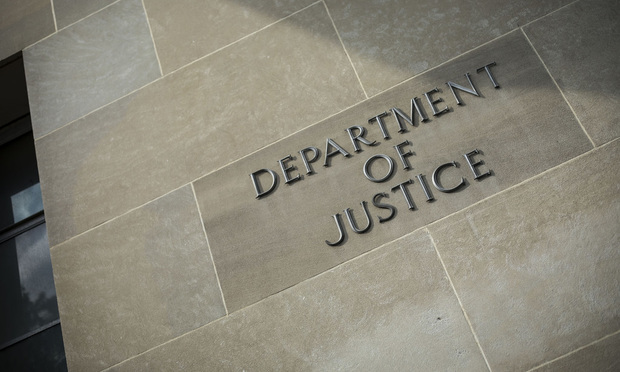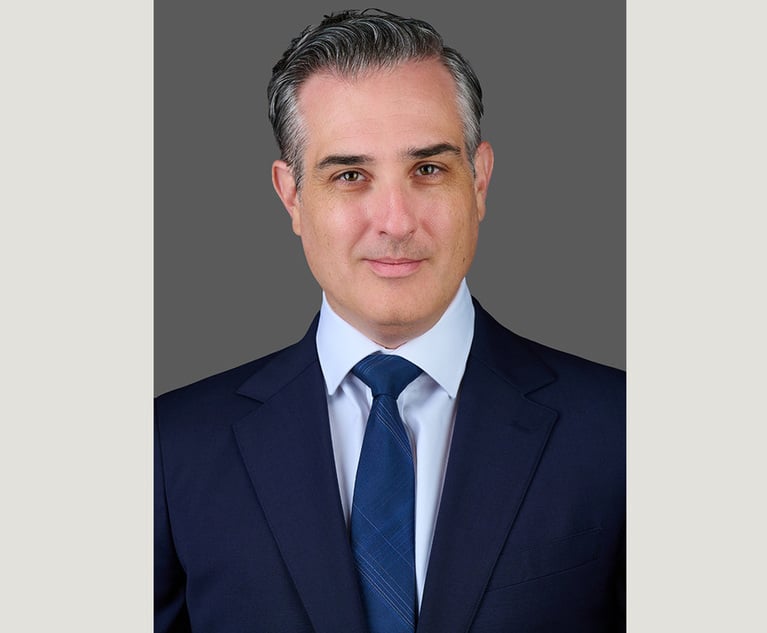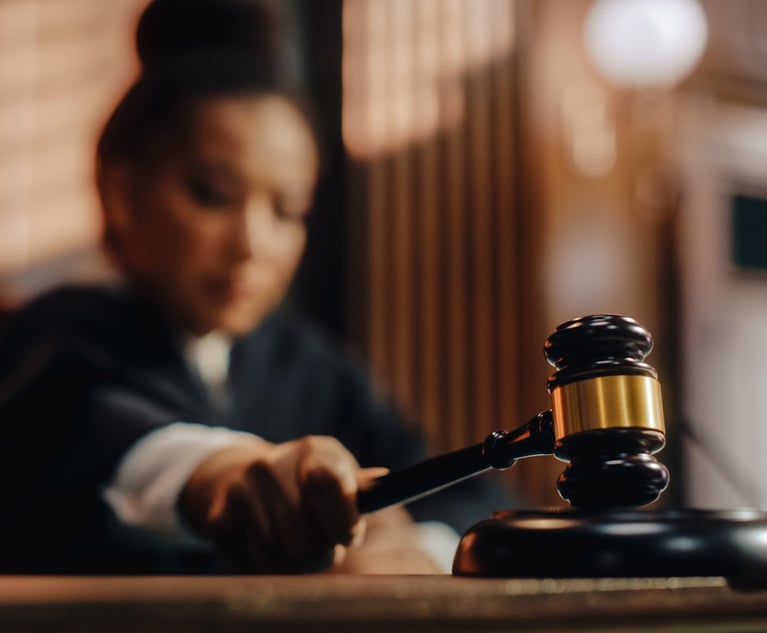DOJ Asked Pa. Judge to Scrub Opinion of References to Cop's Racial Profiling
The U.S. Department of Justice has asked a federal judge in Pennsylvania to censor his own ruling and remove findings that a police officer was untruthful and "very likely" engaged in racial profiling.
December 21, 2017 at 05:22 PM
5 minute read

The U.S. Department of Justice has asked a federal judge in Pennsylvania to censor his own ruling and remove findings that a police officer was untruthful and “very likely” engaged in racial profiling.
But the effort is being opposed by the Pennsylvania chapter of the American Civil Liberties Union and the National Association of Criminal Defense Lawyers.
Federal prosecutors asked U.S. District Judge Barclay Surrick of the Eastern District of Pennsylvania in October to reissue his opinion suppressing evidence from a 2017 traffic stop of two Hispanic men on the Pennsylvania Turnpike by Pennsylvania State Trooper Thomas Fleisher. In its motion for reconsideration, the DOJ said it was not asking the judge to reconsider his suppression ruling, but instead requesting that he issue a new opinion with any references to the trooper's racial profiling and dishonesty removed.
“The government believes that a re-examination of the record would show that those statements are not fair conclusions given the evidence adduced at the hearing,” the DOJ said in its motion. “We respectfully request this court to reconsider its statements concerning racial profiling and the trooper's credibility, and issue a new memorandum without those statements for the following reasons: (1) this court's suppression ruling did not require or depend in any way on a credibility determination; (2) the statements regarding racial profiling and the trooper's credibility create an indelible, and unfair, impression that his testimony was deliberately false and misleading and that he acted out of racial animus; and (3) the memorandum's statements regarding racial profiling and negative credibility have severe professional consequences for a dedicated law enforcement officer.”
On Thursday, the ACLU and the NACDL filed a proposed amicus brief in the case, saying the DOJ's motion for reconsideration ”makes no attempt to meet the stringent standard for hiding from the public information illuminating one of the most fraught issues of our day: the role of
racial prejudice and false testimony in the criminal justice system.”
“Rather than commit to rooting out racial bias in law enforcement, it asks the court to
conceal it. Rather than disavow reliance on law enforcement officers who are less than
scrupulously truthful, it asks the court to protect one. Rather than support the law
enforcement community's efforts to discipline officers who violate their oath to support
and defend our constitution, it asks the court to ensure that this officer remain on the
force, and in the courts. Rather than affirm its commitment to seeking justice rather than
obtaining convictions, it asks the court to facilitate future due process violations. And
rather than acknowledge the salutary effect of daylight on the criminal justice system, it
asks the court to shroud its findings in darkness—in derogation of the First Amendment
and the public interest,” the amicus brief said.
According to Surrick's Sept. 26 memorandum opinion, the vehicle driven by defendant Pedro Ramon Payano was not his and Fleisher claimed that after running the car's license plate through the computer, the owner, Payano's friend Pablo, came up listed as a suspect for “license fraud.” However, Surrick said in his opinion that Fleisher's decision to pull over Payano was “very likely” racially motivated, a finding the judge said was bolstered by Fleisher's remark that the car's passengers were not wearing “suits or any kind of business attire” while traveling from Philadelphia to Pittsburgh and that the type of car Payano was driving was typical of those use by drug traffickers.
The State Police did not respond to a request for comment Thursday, nor did the DOJ.
In a press release, Reggie Shuford, executive director of the ACLU of Pennsylvania, called the motion for reconsideration “a naked attempt by the Department of Justice to hide misconduct by a law enforcement officer.”
“If a state trooper is engaged in misconduct, the public needs to know that. Public transparency improves policing and holds officers accountable to the oath they took to the Constitution,” Shuford said in the release.
Surrick's opinion was in response to Payano's motion to exclude from evidence a kilogram of cocaine found in his possession during the traffic stop, arguing that the stop and the extended roadside interrogation was not legally justified.
In that opinion, Surrick also remained skeptical of Fleisher's version of what happened during the stop.
“Trooper Fleisher's credibility is called into question when his testimony during the hearing is compared to the actual dash-cam footage, which reveals Trooper Fleisher's various embellishments and mischaracterizations of the traffic stop,” the judge said.
According to Surrick, Fleisher followed Payano for 14 miles before pulling him over. “He either was waiting for the Ford Focus to commit a traffic violation, or was mulling over whether 'suspected license fraud' was enough to justify the stop,” Surrick said.
Surrick denied the admission of the cocaine into evidence, and prosecutors were ultimately forced to drop the case.
This content has been archived. It is available through our partners, LexisNexis® and Bloomberg Law.
To view this content, please continue to their sites.
Not a Lexis Subscriber?
Subscribe Now
Not a Bloomberg Law Subscriber?
Subscribe Now
NOT FOR REPRINT
© 2025 ALM Global, LLC, All Rights Reserved. Request academic re-use from www.copyright.com. All other uses, submit a request to [email protected]. For more information visit Asset & Logo Licensing.
You Might Like
View All
People in the News—Jan. 9, 2025—Rawle & Henderson, Armstrong Teasdale
3 minute read


Phila. Court System Pushed to Adapt as Justices Greenlight Changes to Pa.'s Civil Jury Selection Rules
5 minute readTrending Stories
Who Got The Work
Michael G. Bongiorno, Andrew Scott Dulberg and Elizabeth E. Driscoll from Wilmer Cutler Pickering Hale and Dorr have stepped in to represent Symbotic Inc., an A.I.-enabled technology platform that focuses on increasing supply chain efficiency, and other defendants in a pending shareholder derivative lawsuit. The case, filed Oct. 2 in Massachusetts District Court by the Brown Law Firm on behalf of Stephen Austen, accuses certain officers and directors of misleading investors in regard to Symbotic's potential for margin growth by failing to disclose that the company was not equipped to timely deploy its systems or manage expenses through project delays. The case, assigned to U.S. District Judge Nathaniel M. Gorton, is 1:24-cv-12522, Austen v. Cohen et al.
Who Got The Work
Edmund Polubinski and Marie Killmond of Davis Polk & Wardwell have entered appearances for data platform software development company MongoDB and other defendants in a pending shareholder derivative lawsuit. The action, filed Oct. 7 in New York Southern District Court by the Brown Law Firm, accuses the company's directors and/or officers of falsely expressing confidence in the company’s restructuring of its sales incentive plan and downplaying the severity of decreases in its upfront commitments. The case is 1:24-cv-07594, Roy v. Ittycheria et al.
Who Got The Work
Amy O. Bruchs and Kurt F. Ellison of Michael Best & Friedrich have entered appearances for Epic Systems Corp. in a pending employment discrimination lawsuit. The suit was filed Sept. 7 in Wisconsin Western District Court by Levine Eisberner LLC and Siri & Glimstad on behalf of a project manager who claims that he was wrongfully terminated after applying for a religious exemption to the defendant's COVID-19 vaccine mandate. The case, assigned to U.S. Magistrate Judge Anita Marie Boor, is 3:24-cv-00630, Secker, Nathan v. Epic Systems Corporation.
Who Got The Work
David X. Sullivan, Thomas J. Finn and Gregory A. Hall from McCarter & English have entered appearances for Sunrun Installation Services in a pending civil rights lawsuit. The complaint was filed Sept. 4 in Connecticut District Court by attorney Robert M. Berke on behalf of former employee George Edward Steins, who was arrested and charged with employing an unregistered home improvement salesperson. The complaint alleges that had Sunrun informed the Connecticut Department of Consumer Protection that the plaintiff's employment had ended in 2017 and that he no longer held Sunrun's home improvement contractor license, he would not have been hit with charges, which were dismissed in May 2024. The case, assigned to U.S. District Judge Jeffrey A. Meyer, is 3:24-cv-01423, Steins v. Sunrun, Inc. et al.
Who Got The Work
Greenberg Traurig shareholder Joshua L. Raskin has entered an appearance for boohoo.com UK Ltd. in a pending patent infringement lawsuit. The suit, filed Sept. 3 in Texas Eastern District Court by Rozier Hardt McDonough on behalf of Alto Dynamics, asserts five patents related to an online shopping platform. The case, assigned to U.S. District Judge Rodney Gilstrap, is 2:24-cv-00719, Alto Dynamics, LLC v. boohoo.com UK Limited.
Featured Firms
Law Offices of Gary Martin Hays & Associates, P.C.
(470) 294-1674
Law Offices of Mark E. Salomone
(857) 444-6468
Smith & Hassler
(713) 739-1250





